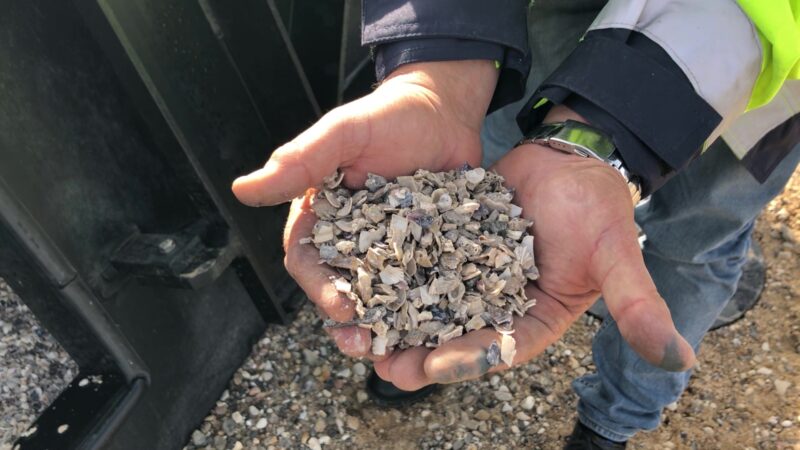This is a novel, cost-efficient and sustainable method to prevent problems with hydrogen sulphide in sewer systems and wastewater treatment plants, using mussel shells available in abundance along the Danish and Swedish coast lines. The method has previously been tested by Aarhus Vand (Denmark) in large scale and was now optimized and tested for small scale use in Sjöbo Municipality in Sweden.
The presence of hydrogen sulphide is an increasing problem in sewer systems due to the trend of centralization of wastewater treatment plants resulting in longer pumping distances in pressurized systems. Many pressurized systems are hydraulically oversized, with consequently longer retention times which promotes the formation of hydrogen sulfide.
Under anaerobic conditions in pressurized systems, hydrogen sulfide can be formed in the water phase, which subsequently can be released as gas in gravity systems. Hydrogen sulphide is a toxic gas and causes a number of problems both with respect to odour and working environment safety. The gas is corrosive and has deterious effects on concrete and metal structures. In order not to risk major damage to concrete pipes and pumping stations as well as risk a safe environment, measures should be looked at.
There are various techniques proposed to prevent the release of hydrogen sulphide where dosing of nitrate or iron salt- based chemicals are the most common measures followed by different types of aeration devices. There are also methods based on bioaugmentation of different bacteria. The methods have been used with varying results, but more efficient ones are often associated with high capital – and/or operational costs.
The mussel shell filters
Using mussel shell filters for treatment of hydrogen sulphide-containing air is a cost efficient and sustainable alternative without the use of chemicals. The mussel shells provide calcium, which reacts with the hydrogen sulphide creating gypsum. Different lime-based filter media could be used, but mussel shells were chosen since they constitute a natural “waste product” available at low cost.
The hydrogen sulphide-containing air stream is injected at the inlet of the filter and lead through the filter bed. Water is sprayed over the filter material to wash out the formed gypsum. The filter is designed based on air volume and hydrogen sulphide concentration.
Case: Sjöbo Municipality
In Sjöbo Municipality the wastewater treatment plants in Blentarp and Sövde have been closed down and the wastewater treatment has been centralized to the Sjöbo wastewater treatment plant. The centralization has led to the above-mentioned challenge of hydrogen sulphide formation resulting in severe problems at the pumping stations and complaints from nearby residents.
The mussel filters have previously been tested as a large-scale solution at Aarhus Vand in Denmark with good results. The large filters can however only be used in places with plenty of space and in this work a smaller module with lower footprint was developed and tested. In Sjöbo flow data and measurements of sulphide-levels were collected to form a design basis for the small-scale filter. A suitable location was chosen at one of the pumping stations, based on odour complaints, layout of the sewer system and available area in the surroundings.











